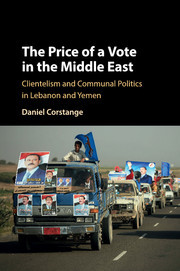Description
The Price of a Vote in the Middle East
Clientelism and Communal Politics in Lebanon and Yemen
Cambridge Studies in Comparative Politics Series
Author: Corstange Daniel
Some ethnic communities receive generous material rewards for their political support, whilst others only receive very modest payoffs.
Language: English
Subject for The Price of a Vote in the Middle East:
Approximative price 31.58 €
In Print (Delivery period: 14 days).
Add to cart
The Price of a Vote in the Middle East
Publication date: 09-2017
Support: Print on demand
Publication date: 09-2017
Support: Print on demand
Approximative price 101.56 €
In Print (Delivery period: 14 days).
Add to cart
The Price of a Vote in the Middle East
Publication date: 09-2016
Support: Print on demand
Publication date: 09-2016
Support: Print on demand
Description
/li>Contents
/li>Biography
/li>
Clientelism and ethnic favoritism appear to go hand in hand in many diverse societies in the developing world. However, while some ethnic communities receive generous material rewards for their political support, others receive very modest payoffs. The Price of a Vote in the Middle East examines this key - and often overlooked - component of clientelism. The author draws on elite interviews and original survey data collected during his years of field research in Lebanon and Yemen; two Arab countries in which political constituencies follow sectarian, regional, and tribal divisions. He demonstrates that voters in internally-competitive communal groups receive more, and better, payoffs for their political support than voters trapped in uncompetitive groups dominated by a single, hegemonic leader. Ultimately, politicians provide services when compelled by competitive pressures to do so, whereas leaders sheltered from competition can, and do, take their supporters for granted.
1. Introduction; 2. Ethnic constituencies; 3. Communal politics in Lebanon; 4. Communal politics in Yemen; 5. Contemporary clientelism; 6. Captive audiences and public services; 7. Intermingled vote markets; 8. Perverse competition; 9. Conclusion.
Daniel Corstange is an Assistant Professor at Columbia University, New York, and a member of Experiments in Governance and Politics (EGAP). His research has won awards in international relations, political methodology, and fieldwork. He has conducted field research in a number of Arab countries, including Egypt, Jordan, Lebanon, Morocco, and Yemen.
© 2024 LAVOISIER S.A.S.




